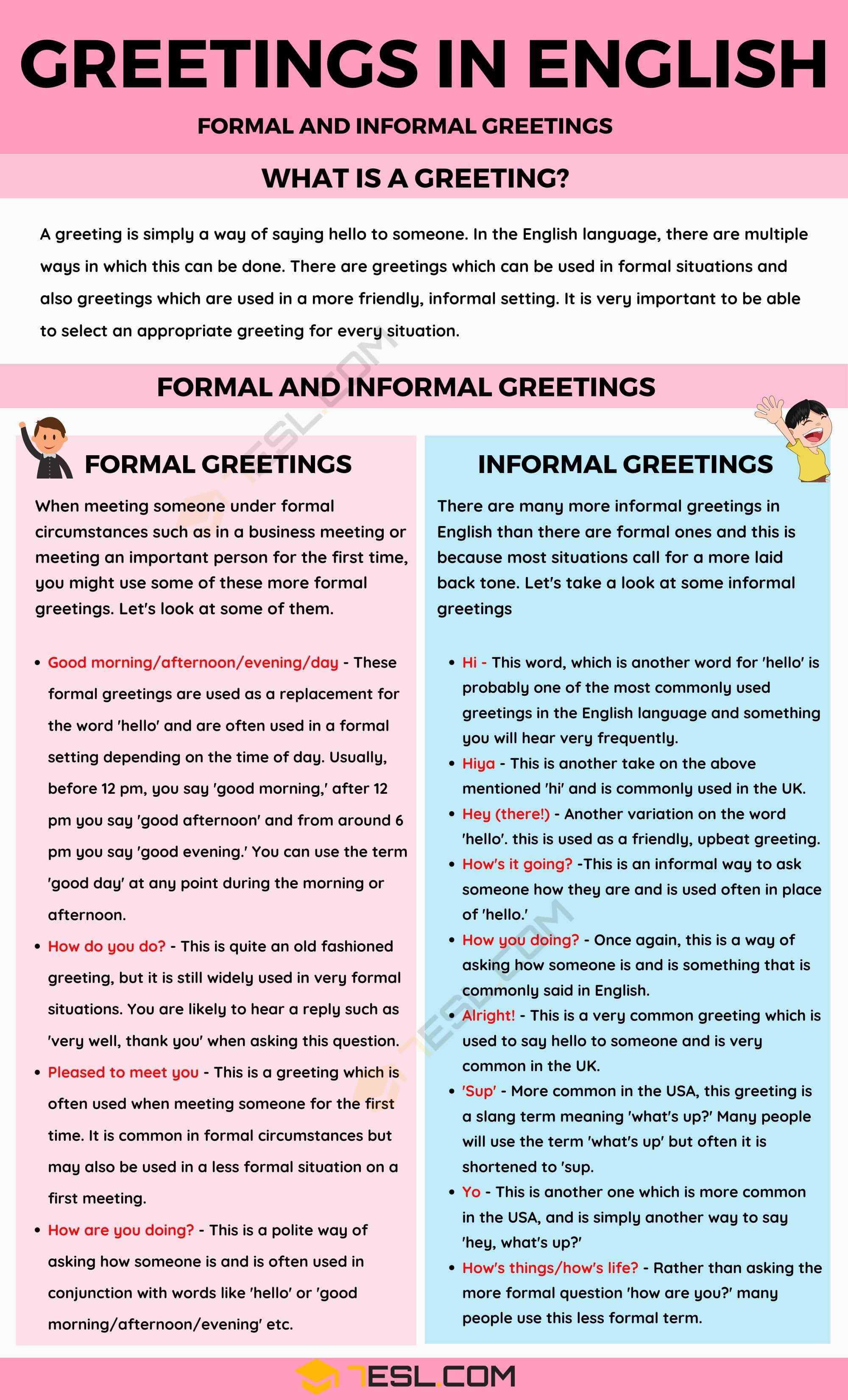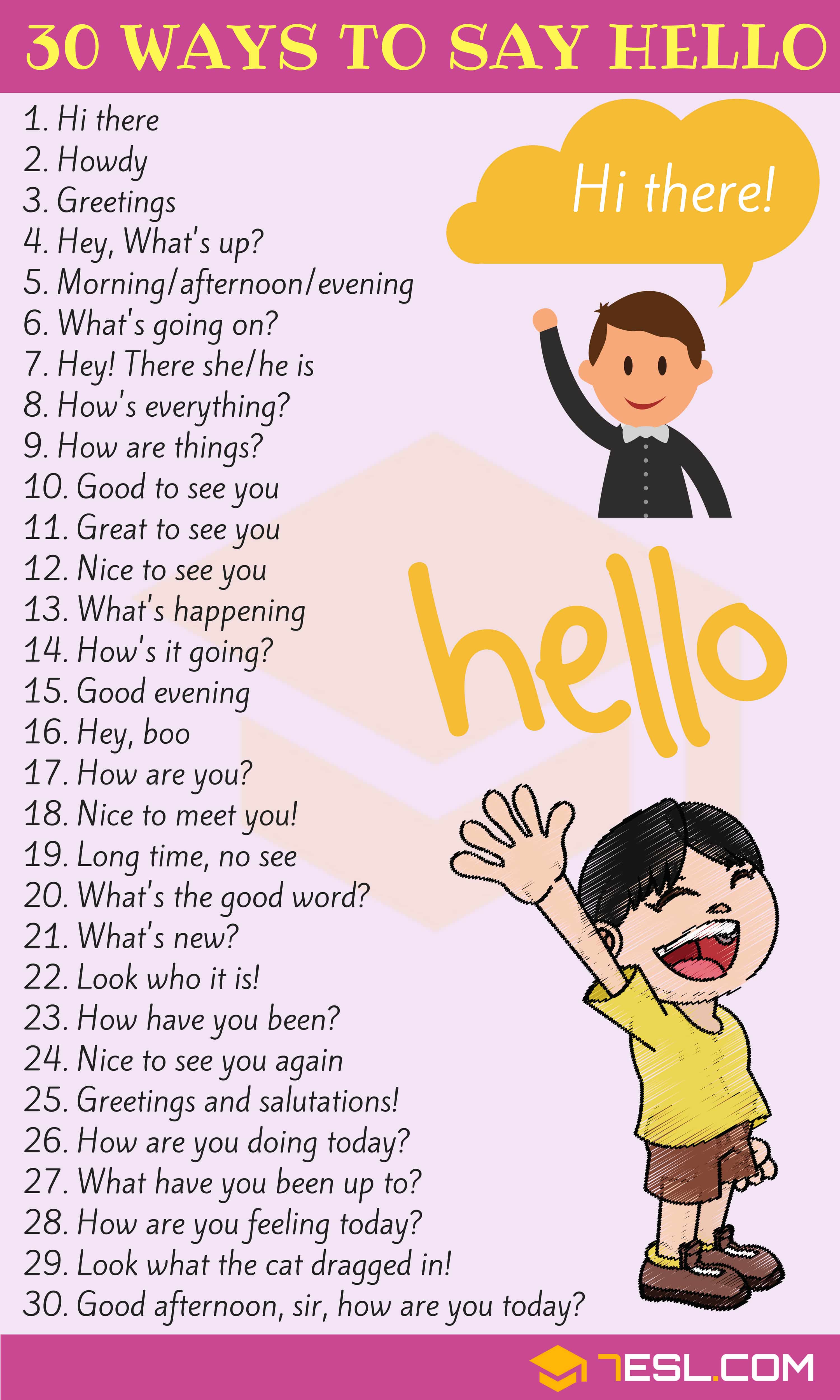Greetings in English! In any situation when using the English language, there will be times that you are required to greet someone and it is therefore very important that you have this type of vocabulary under your belt. In this article, we will be looking at various greetings that can be used in a variety of situations when conversing with English speaking people.
What Is A Greeting?
A greeting is simply a way of saying hello to someone. In the English language, there are multiple ways in which this can be done. There are greetings which can be used in formal situations and also greetings which are used in a more friendly, informal setting. It is very important to be able to select an appropriate greeting for every situation. We will be looking at this a little more closely in the next section.
Formal Greetings
When meeting someone under formal circumstances such as in a business meeting or meeting an important person for the first time, you might use some of these more formal greetings. If you are ever in any sort of doubt as to whether you should use a formal or informal greeting, it is always better to opt for the formal to avoid causing offence. If the situation calls for an informal greeting, the other speaker will likely signal this.
- Good morning/afternoon/evening/day – These formal greetings are used as a replacement for the word ‘hello’ and are often used in a formal setting depending on the time of day. Usually, before 12 pm, you say ‘good morning,’ after 12 pm you say ‘good afternoon‘ and from around 6 pm you say ‘good evening.’ You can use the term ‘good day’ at any point during the morning or afternoon.
- How do you do? – This is quite an old-fashioned greeting, but it is still widely used in very formal situations. You are likely to hear a reply such as ‘very well, thank you’ when asking this question.
- Pleased to meet you – This is a greeting which is often used when meeting someone for the first time. It is common in formal circumstances but may also be used in a less formal situation on a first meeting.
- How are you doing? – This is a polite way of asking how someone is and is often used in conjunction with words like ‘hello’ or ‘good morning/afternoon/evening’ etc.
Informal Greetings
There are many more informal greetings in English than there are formal ones and this is because most situations call for a more laid back tone. We are now going to take a look at some informal greetings which you can use with English speaking friends, family or anyone else that you are familiar with.
- Hi – This word, which is another word for ‘hello‘ is probably one of the most commonly used greetings in the English language and something you will hear very frequently.
- Hiya – This is another take on the above mentioned ‘hi’ and is commonly used in the UK.
- Hey (there!) – Another variation on the word ‘hello’. this is used as a friendly, upbeat greeting.
- How’s it going? -This is an informal way to ask someone how they are and is used often in place of ‘hello.’
- How you doing? – Once again, this is a way of asking how someone is and is something that is commonly said in English.
- Alright! – This is a very common greeting which is used to say hello to someone and is very common in the UK.
- ‘Sup – More common in the USA, this greeting is a slang term meaning ‘what’s up?’ Many people will use the term ‘what’s up’ but often it is shortened to ‘sup.
- Yo – This is another one which is more common in the USA, and is simply another way to say ‘hey, what’s up?’
- How’s things/how’s life? – Rather than asking the more formal question ‘how are you?’ many people use this less formal term.
- Long time, no see – This greeting is usually used when bumping into a person who you have not seen for a long time.
Conclusion
There are many ways in which you can greet someone using the English language. Depending on whether the situation is formal or informal will depend on what sort of greeting you use. There are so many to choose from that you can truly make your greetings diverse and interesting.
Greetings Infographic









0 Comments